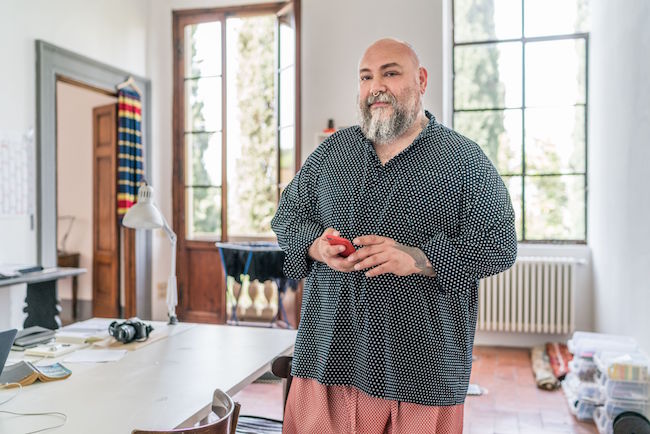
The political act of enjoying life
A conversation with artist Viron Erol Vert
10/01/2019
I can still clearly recall, sometime in early summer of last year, the opening of the musically meditative event Ambereum – as created by Viron Erol Vert, a German artist of Turkish descent. The project was part of the 1st Riga International Biennial of Contemporary Art (RIBOCA), and had been set up at Art Station Dubulti in Riga’s neighbouring city of Jūrmala. The assembled audience had been instructed on the purpose of the yellowy orange space, almost hermetically outfitted with mirrors and cushions: one could come and ‘be with oneself’, meditating at length to the consciousness-transforming music being played over the loudspeakers. I was energised and rather antsy that day, and my mind couldn’t settle down to a session of simply sitting and listening to music with my eyes closed, so I decided to leave them open and observe the people around me. My attention was immediately drawn to what was arguably the most noticeable figure in the room: a very large, bearded man with a bald head, eccentrically dressed in clothing that featured elements of both the Hindu and Islamic worlds. Like myself, he chose not to sit down and relax, but rather slowly moved about the space, observing his surroundings while ever so lightly shaking along to the music. I had no idea who this person was, yet the moment I spotted him, I knew I would like to someday talk to him. Congenital shyness prohibited me from approaching him that day, and I resigned leaving any future meeting up to the fates. Only some time later did I learn that this person had been no one else but Viron Erol Vert – the artist responsible for the conception and execution of Ambereum. Luckily, not too long after that, Vert came to Latvia on a return visit and I was able to realise my ambition of meeting in person the interesting man who had captured my attention some months before.
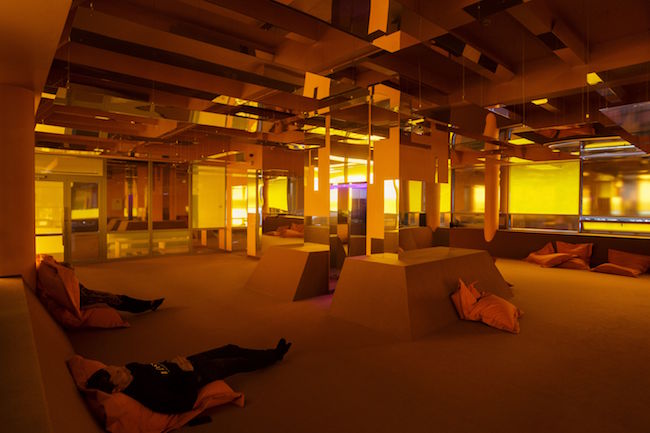
Viron Erol Vert. Ambereum at Art Station Dubulti. Photo: Andrejs Strokins
Vert’s forbears were Orthodox Greeks who lived in Istanbul, but his parents moved to Germany when they were young, and so it came to be that Vert was born in their new homeland. Upon finishing high school, Vert went to Berlin to study fashion design, from which he later switched to the more general visual arts. Life as a student in the big city was not cheap, so in the mid-90s Vert began to work as a bouncer at a Berlin nightclub. Neither Vert nor anyone else at that time could have guessed that this particular nightclub – Berghain – would eventually become a legend known far and wide beyond the confines of Berlin. It is most likely that Vert also did not yet realise that his friend and coworker at the club, Sven Marquardt, would notoriously still be working there today – despite having become a famous photographer over the intervening years. ‘Sven usually stood by the door, while I was a bit further inside – next to ticketing and the guest list,’ Vert casually recalls. Vert and Marquardt have worked on some joint photography projects and are still friends, even though Vert has long since abandoned his job as a bouncer. Although Vert has subsequently gone through various transformations in terms of artistic interests and expressions, he still has a deep interest in music as a transforming force of consciousness and tends to use it in his projects. In the last few years these projects have been, for the most part, the creation of unique spaces that pull people out of the routine of daily life – spaces where people can meet, slow down, and share experiences that would not be possible anywhere else. For four months, Ambereum became just such a space for many of the residents of Jūrmala, as well as for more distant visitors whose artistic curiosity had beckoned them to the seaside resort town. At the conceptual core of the project was Vert’s own research of Latvian culture and traditions, melded with elements of Greek and Roman mythology (e.g. in a nod to the nine ancient Greek muses, Vert selected nine musicians whose works were continually played throughout the length of the ‘amber room’ event). The information that Vert had learned about amber and Latvian traditions and seasonal festivals also served as inspiration for Vert’s ambitious midsummer celebration in the Riga neighbourhood of Andrejsala on the night of June 21-22, the date of the astronomical summer solstice. Once again, he had brought together something local and newly discovered (for him) with something completely different but more familiar to him personally – namely, the groove of the 90s Berlin techno scene – by having famous techno DJs from various countries transform an abandoned Riga industrial park into an all-night rave party that lasted well into the afternoon of the following day.
This sort of combination of assorted elements is the principle feature of Vert’s modus operandi for creating the wildly diverse forms of artistic expression that he is known for. Greatly influenced by his own mixture of dissimilar heritages, he strives to uncover the contradictions and opposites that make up human society – which can be either real or imaginary – and tries to construct new ways and new realities in which we can observe these antipathies.
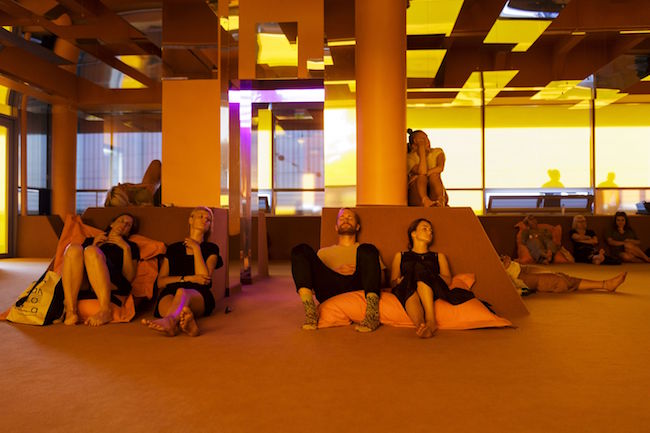
Viron Erol Vert. Ambereum at Art Station Dubulti. Photo: Andrejs Strokins
Why where you initially interested in fashion design?
I think my interest in fashion was actually an interest in the human being. When you’re younger, you don't understand things so fast; you don’t have much experience, and you don’t know how to best analyse yourself. Later, I understood that, for me, the most interesting thing was to link the clothes to the senses – to the question of character, of identity. The human, the person – we as a society – are actually always in the centre of my work; and fashion, as our second skin, is also linked to it in a very superficial way.
Superficial?
Yes, of course, very superficially – but not in a negative way. It's just that fashion does not come into being by itself – somebody creates it. Of course, nowadays fashion has very much become an industry: it has collections that change very rapidly, and it's all very commercialised. It’s very much a kind of time-linked form of design and art. And you have to decide for yourself if you want to give away your passion to these very short-lived elements that change every three months – as soon as a new collection comes along. I was not interested in the fashion of ‘right now’ – it was too narrow for me. That’s why I left it and went to study Textile and Surface Design in Berlin, and which is what I got my master's degree in.Then it slowly developed into what it is that I do now.
But why were you interested in the visual arts in general?
I think this is something that you have inside you – it’s not something that you decide. I come from a family that's very open but also, at the same time, very strict in an old-fashioned way.
Can you elaborate on this seeming contradiction?
It was open in the sense that my parents were (and still are) very open-minded persons, but their cultural background is from the Mediterranean – Istanbul, where the Greek, Turkish and Christian all come together. My parents were Istanbul Christians, which, of course, made them a bit different from others. From that point of view, if I look at the rest of my family, my parents are the most open ones; their parents were much more strict. This is probably (at least partly) because they moved to Germany when they were young. But all parents pass on the history of their ancestors to their children – in one way or another.
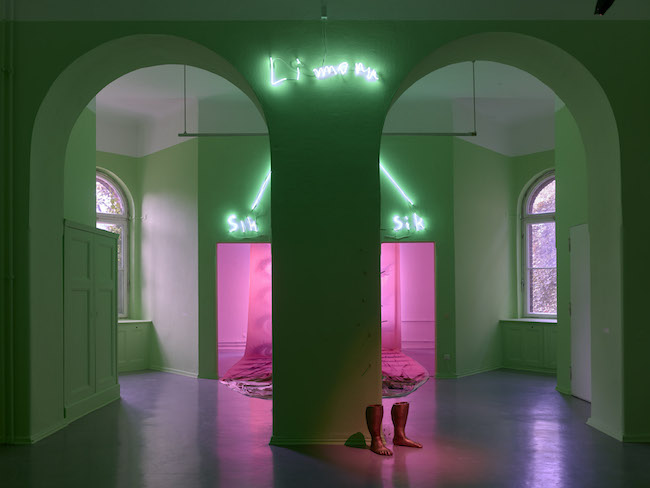
Viron Erol Vert. Installation Born in the Purple. @ Kunstraum Kreuzberg / Bethanien, Berlin
Do you remember the moment when you realised that art is something that you want to do?
Yes; I think in my case it was like... I always wanted to do something like that, but for a long time I did not know how to go about it. My parents were pretty far from art. My father’s a doctor – very ‘classic’; my mother was a young woman from a well-situated, conservative family in Istanbul. But they were both very cosmopolitan, too, for they spoke several languages and knew a lot of different people in Istanbul. But for me, art was something that I had to ‘open up’ for myself; when I was a young boy, I always felt an obscure wish to do something like that but I didn’t know what, exactly, to do. Little by little, I started to open up, first through fashion and so on... The more I lived my life, the more it opened up. It was a personal development. It should be noted that my parents and I largely grew up in different cultures. The house of my parents, the music that they listened to, and the decorations in the house that they had in Germany – it was a full-on Istanbul apartment: anything you can imagine, from the crystalline lamp to the oriental carpet, and more. It was really like a UFO that had come straight from downtown Istanbul and had landed in a German village. It was a little town, with maybe four foreigners – their friends and neighbours were mostly German.
Was the fact that you have a very mixed cultural background and identity ever a problem for you?
Yes. You always have two different positions in mind, and you’re always jumping from one to the other. You don’t have one thing, one culture, one home, or one universe in which you can totally put yourself in and live your life out of. You naturally have several different backgrounds. This also makes you an instant polyglot – you’re much more used to being in various different worlds. This is something that I’ve personally always appreciated and liked very much, but on the other hand, you never really feel at home anywhere – in some sense, you always feel like a foreigner. You are never a Turk if you’re in Turkey. Or you’re never a German in Germany. In Germany, you’re always ‘the Turk’, and in Turkey, you are ‘theGerman’… It’s always the case that ‘the other’ side of you is the one chosen for your description. This is something that you have to learn to deal with. I think that it’s becoming much more normal now – our world is coming together, and we have been in a process of globalisation for many years already…
How did you learn to deal with all this?
I think that, in a way, I understood that I don’t have to decide. That I don't have to make a decision about where I belong. I think that this is one of the most important things that we have to understand about ourselves; otherwise, you put yourself in a way too narrow…
Do you mean that you don't have to decide because it is something that has been given to you?
It is ‘given’ by the way how things simply are. It was ‘given’ to me by the way in which I was socialised; I was born into it. And I don’t have to choose whether I am one or the other. While being here [in Latvia], I learned that it's quite similar here with the Russians and Latvians – many people don't really know what they are. It’s the same thing. You don't have to choose; you don’t have to say: I want to be only one or the other. You’re both – culturally, linguistically, in terms of food...in everything. I always found it very hard for me, but it would also be a pity to leave one part aside. I think that the more diverse you are, the better.
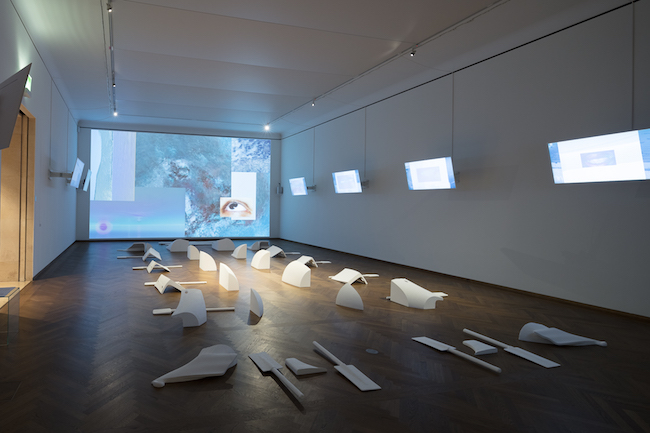
Viron Erol Vert. Installation Of Part and Loaf. @Leopold Museum, Wien, A
So, you slowly developed into an artist. If I may ask, how would you reflect on the following questions: What does being an artist mean? What does it entail?
(Thinks.) I think you either are an artist, or you’re not. To ‘become’ an artist is not possible. I think you can learn to express yourself better, but what is inside you has already been inside of you from the very first. You’ve had it since childhood. Of course, there are issues such as your parents, or your society, or your family, or financial background, or which country you live in – that is, whether you are given the possibility to search for it or to let it out – but this is not something you can become. I think it is something that is already inside you from your very first breath. But how you live with it, or how you live it out – that’s another question.
What does being an artist entail specifically for you? How does it differ from other modes of being and modes of expression – or other activities?
If I look back at my career (or whatever you call it), I have been into totally different things. I was, at first, much more into illustration and drawings. Later on, I was more into having an exchange with carpenters – I was doing a lot more work with materials and with surfaces and forms. It was more about design objects, and traditional craftsmanship was very important for me. Later, this developed into what I have been doing now for the last two and a half years, which is creating spaces. It is important for me to create spaces where I can share a moment with people. Right now, that is what art is for me, and what I want to do. It's becoming increasingly important to have a moment of sharing. A moment of sharing knowledge – for instance, via music – as it happened in Dubulti. It’s not necessarily a clear, classical exchange of knowledge in which someone, say, a scientist, comes and explains something. Although that, too, has happened in spaces that I have created. It's much more interesting for me to create spaces in which different people share very different kinds of knowledge and are together in a moment.
In this age of new and aggressive, manipulative media and an overwhelming amount of information...and the social-political situation that we are in right now, which also affects how the art world is developing...and how our society is developing in what, I think, is not at all a good direction... In such a situation, I feel that it's important to create a space where people who are still open enough can come together and share – to have this moment of sharing. For me, that's more interesting than making another painting, object, or sculpture and putting it on the market or in an art fair and constantly checking whether it has sold or not – all this kind of stuff. At some point, I personally found all of this secular aspect of being an artist very tiring. Which is not to say that I couldn’t do it if I wanted to, but right now, I’m just not interested in that. For me, to have the kind of moment I just described is much more important. And much more satisfying.
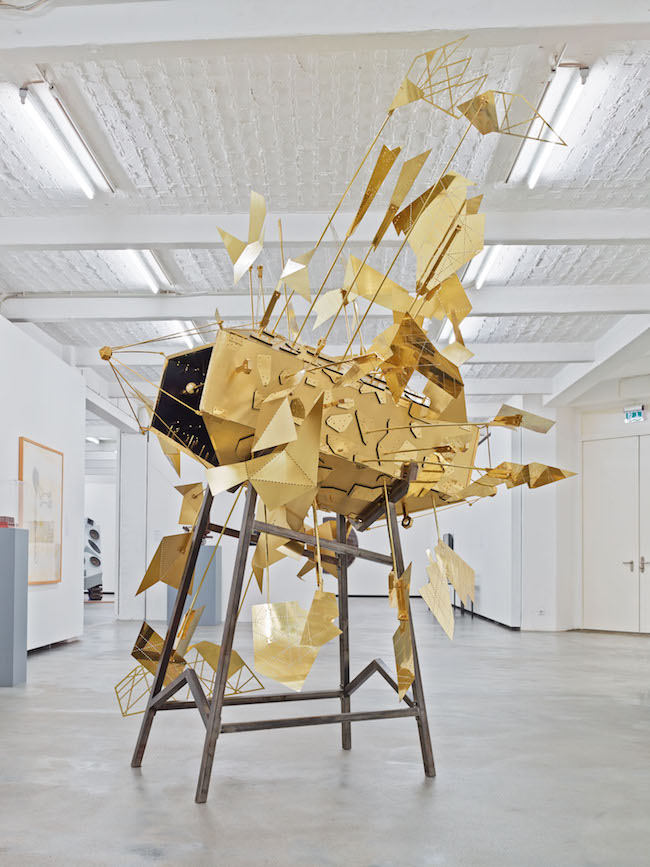
Viron Erol Vert. Installation Abraham1. @Kunstraum Bethanien, Berlin
Why do you use the word ‘secular’?
What I mean by that is the part of art in which you have to study and think about the [art] market, money, selling prices, if your works are going up or down [in price], is your gallery popular, do you have enough followers, etc. Questions like these I call ‘secular’ questions.
What are the most interesting reactions/feedback that you have received about the space in Dubulti?
The feedback is, in general, very, very good; it’s actually extraordinarily nice. What I really like is that very different kinds of people came. Not only intellectuals and people who know the art world, such as curators or writers, but also a lot of people from Jūrmala and nearby villages that were just passing by – old grandmothers that had a minute between doing their shopping and catching the train. I like such a clash, such an exchange of worlds. I think it is very important for us – so that we can understand the world better, or at least, understand that we’re not alone. The world is so diverse; we have to understand that there are so many different things, and that they all have the right to be. It’s not like ‘ours’, ‘mine’, or ‘yours’ is the only one that has the right to be. I think that this is such an important realisation especially now, when we have all of these elements like ‘America first’, the [political] developments in Turkey, the [economic] crisis in Greece, the [migrant] drama in the Mediterranean... We must never forget that there are so many different perspectives, and we have to understand that all of these perspectives need to have a place here. I have a feeling that things will get more complicated in the coming months and years – society is in a very critical moment right now. There’s also the point of view that a space in which you can ‘have a moment and just drop into yourself’...there’s a certain political and luxurious element about it, I think.
What’s political about that?
To be able to enjoy your life and your time. I think that's really luxurious these days because we’re so full of information that's been manipulated, full of paranoia...the world is moving faster, we have fewer and fewer trees and less and less money...don’t do this, don't do that – you know, all these things.
Are you saying that enjoying your life is a form of protest?
Maybe it always has been – I think this is a very old topic. But I think it is always important to remember it. This doesn’t mean that we have to party all the time, or that we have to overdose various substances. Being in a space that is so unlike the political climate is also a way of enjoying life.
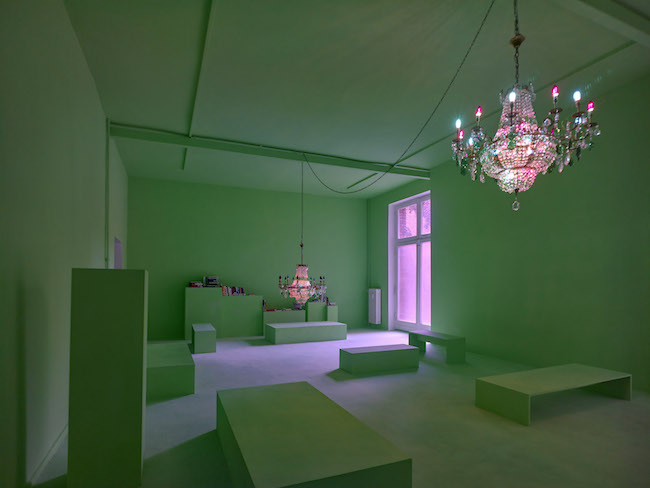
Viron Erol Vert. Born in the Purple. Porphyra Club.
Do you have a feeling that humanity is heading towards a new catastrophe?
I think we are already in it. Not in the sense that there is, say, a storm or a war, but I do think that we’re already in it. I can say this, of course, because I have roots coming from several of these hot spots... For instance, what happened in Turkey influenced my life fundamentally; there is a big diaspora of Turkish artists and cultural people that have left the country. They live mostly in Berlin or London or Paris... There is a whole society of people that have had to leave their country because they don’t have a place there anymore; they're not wanted there right now. I’m also linked to Greece. I was in Greece when the financial crisis erupted; I was in Patras, and suddenly I could not take out my cash [from the bank]! I was in Patras with my last forty euros. At least I had a plane ticket, so I took a bus to Athens, to spend the last two or three days until my flight at the airport, with just those 40 euros in my pocket. At least I had such a possibility. But no one could take their money out. I saw people sitting there, petrified, papers clenched in their hands, not knowing what to do... I could cry just from remembering it because it was so... First of all, it happened immediately, and to everyone, at once. People are never ready for such events. In my life, I have these geographic points of reference from which I can see that we have already changed so much and in a direction that I, personally, don’t think is the right one. And it concerns the whole of Europe. We are very much in a moment where these kinds of small, seemingly local elements can spark into a huge fire of flames. I think we have to pay attention to this.
Do you see any way in which to reverse or fix this process?
I am not a politician; I’m an artist, but I think that the key is in what I mentioned earlier, that is, in respecting and trying to understand. Trying to understand that it is not ‘America first’ or ‘Riga first’ or ‘Germany first’. We are all in this together; this is one planet. It is getting fuller, there are increasingly fewer resources, and instead of saying: ‘No, I want all the resources for myself,’ we have to find a way to share the resources and also save them for the future. This is a question of character as well, in my opinion. I am more of a person who thinks: ‘I would much rather achieve something together instead of only following my preferences and my ego’. Selfishness takes more time than working together. But we don't have much time. At some point, we’ll understand that our only chance is to come together again. I don’t know if this will be possible because we, as human beings, also have this animalistic, instinctive way of surviving and getting something for ourselves. We have to work on that, too. Perhaps I create such spaces in order to deliver a political statement – relax a little bit, hang out and chill, it's going to be ok…
Could you tell me a bit about the 90s in Berlin? What do you think it was that made late-20th-century Berlin such a special place...and which it still partly is?
I went to Berlin about five or six years after the wall had come down. Of course, the Eastern part was in drama and crisis, including an identity crisis, but the West had become a totally new environment that was so open and extraordinary that it was almost surreal. Only now can I truly understand how special it was. I was too young and too innocent, and not reflective enough, to understand that at the time. Luckily, destinybrought me there; I think those may have been the best times of my life. The clubs were very much the melting point between East and West. There weren’t many foreigners there back then, maybe some Turkish guest workers, a few Chinese. Within the club and music scenes, people were coming together...East and West were coming together, they were taking drugs together, partying together... That was really a moment of ‘melting’. I think this was a very special moment, of the kind that you have very rarely anywhere in the world. And we had a lot of space – it was very cheap, and you had a lot of time to experiment – also sexually. Everybody who did not want to go into the army, or who was gay or different, was going to West Berlin to live.
Did you experiment?
Sure. As one should when one is young. I will not get into personal details,but you can imagine that it was very free...and it still is sometimes, even now. I am not involved in anything anymore; now I’m more of a hermit, and I’m happy to have more space and time to myself. But if you go to Berlin, you can still go all the way – perhaps now even more so because everything is so established… It also means that Berlin is becoming a kind of brand. Before, it was very innocent and very free, but now Berlin is very much becoming a brand. And that’s a problem.
So, despite the fact that you were young, poor, wanted to study, and had to work to make ends meet, you nevertheless loved it and identified yourself as a part of it?
Of course I loved it! Luckily, in my life – up to the present moment – I have never known where the future will take me. I can say that I always enjoyed and always loved what I did at the moment. Even working in the club...all the things that I did there. It was like a school – a school of society, a school of humans. When you work in a club, you see a lot of people...thousands of people going in and out; and often times, a lot of people on drugs – in altered states of mind. In certain circumstances, you could look at human beings or society from a point of view that was completely different than the normal one. This was something that inspired me very much. So, I’ll say that the job was very very hard, but I also loved it – and that is the reason why I did it for so long. I enjoyed the exchange and what I learned about life and society. It was extraordinary.
Is producing your artwork usually hard for you?
Yeah, sure – it’s a challenge. It involves a lot of suffering. It’s not a job that you can close down, that you do from 9 to 5, and then say – that's it, I'm going home – and then stop thinking about it. If you are in this process, you are there for 24 hours; it takes up all of your physical and mental resources. Of course, it is a great thing, and few things make me happier than being in a space that I have created, and that used to be just an idea... But such a commitment is hard work. If you are immersed in something 24/7, it influences your whole life at that moment. It influences how you go to the toilet, it influences how you eat, it influences how you walk down the street...if you notice a person or not – things like that.
Would you say that creativity is painful?
It is not painful – it is intense. And it should be intense, I think. Being creative means finding the essence of something, finding the core of something – of a feeling, of a view, of a relationship, of a talk. It's hard to find the essence of something, and it is intense whether you want it to be or not. You cannot choose that, I believe.
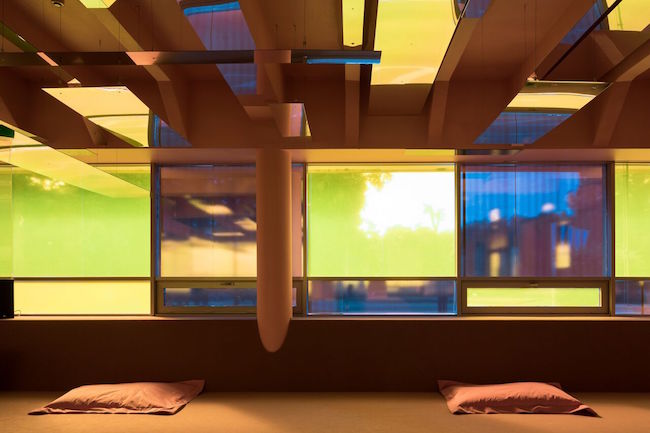
Viron Erol Vert. Ambereum at Art Station Dubulti. Photo: Andrejs Strokins
But being an artist sometimes means doing certain tasks within deadlines. You are told: ‘The biennial starts on X date, and this your space. Now do something!’ What are your methods for finding inspiration and coming up with ideas?
First of all, I look at the given space. I try to pay attention to the story and history of the place, to all of the details revealed to me through my research. The first principle is to be as open as possible.For the process to begin, you have to open your soul and open your mind. And sometimes that is challenging. This is always very hard when you work artistically, yet you also work in another job or have other things in life that require a different kind of attention. So, what you get inside is much more than you normally would like to get inside yourself. You have your antennas tuned to a high sensitivity, and if you don’t take care, you can get into things that you don’t want to see or you don’t want to get inside of – this often happens to children. So, you have to be very open and very careful at the same time. It's important to understand when to be open and when to close oneself off – that is, if you know how to do that. I think this is also a very big part of being creative.
When encountering an artwork that is not yours, by what criteria do you decide whether it’s good art, bad art, or whether it’s worth anything at all?
It has to capture me in the very first moment.
Right away?
Yes.
Do you mean immediately, at first sight, without even reading the text?
Yes. I know that this is something a lot of people don’t do and don't agree with. I also think that it is important to know the background and the research that's been done; I certainly don’t think that that is unimportant. Personally, I usually have a long process of background research behind my works. But I’m a very visual person, and an artwork has to be have something that lifts me into a different perspective. It can be funny, it can be deep, it can be shocking– whatever. But the moment of surprise is something that I appreciate most.
Which would mean that the artist in question has managed to find something new.
Yes. I am not very interested in copying and repetition. Sure, there are exceptions – such as Gavin Turk, who copies himself all the time, but he does it in a very dramatic and funny way. This is something that I understand totally, and I find it very interesting. But for me, personally, I have to enjoy what I do. And I only enjoy things that are new for me.
I saw you dancing at the Solstice event in Andrejsala.
Yes. You were dancing, too.
When you stop and think about, it’s kind of a weird, ritualistic activity. Why do people dance?
Of course, when you see yourself doing it, it's sometimes very funny... (Laughs.) But, as I said, we all have something we can metaphorically call antennas. We have something inside us – we hear, we see something, and the antennas react to it. Dancing is your reaction. It’s a transformation of what you perceive. In such a way, we express all of the transformations happening to us – the context of the party, the conversations, the music, the lights, everything we have drunk or smoked... We are antennas that transmit and transform all of these impulses. I think that there is, of course, a ritualistic element to it, but also a spiritual one, definitely. But I was dancing just a little bit because I was, so to say, the host. The one with responsibility. I had to make sure that everyone was alright.
You had to take care of everyone.
Yes, it's taking care of someone. It's still in me from the club times, perhaps. If I let people into my event, I have to take care that everyone is alright. I can't do it any other way.
Thank you very much for your time, Viron!
Thank you, too! It was a pleasure to talk with you.
